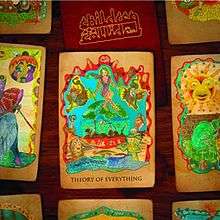Theory of Everything (album)
Theory of Everything is the second studio album by Australian indie rock band Children Collide. The album was recorded in Los Angeles and Melbourne, Australia. It was produced by Rob Schnapf in the United States and Woody Annison in Melbourne. The album was released by Universal in Australia on 27 August 2010. The first single, "Jellylegs", was released on 18 June 2010, and reached number 72 on the Australian ARIA Charts.
| Theory of Everything | ||||
|---|---|---|---|---|
 | ||||
| Studio album by | ||||
| Released | ||||
| Recorded | Sound Factory, Hollywood, CA, USA; Sonora Recorders, Atwater Village, CA, USA; Studio One, Collingwood, Vic, Australia | |||
| Genre | Rock Indie rock Grunge | |||
| Length | 42:46 | |||
| Label | Universal | |||
| Producer | Rob Schnapf, Paul "Woody" Annison | |||
| Children Collide chronology | ||||
| ||||
| Singles from Theory of Everything | ||||
| ||||
Several different special editions of the album were made available for pre-orders via the Children Collide website and other online stores. These included limited edition Tarot cards and limited edition singles.
Track listing
| No. | Title | Length |
|---|---|---|
| 1. | "Future Monks" | 3:17 |
| 2. | "Jellylegs" | 3:39 |
| 3. | "Asleep on My Feet" | 3:47 |
| 4. | "My Eagle" | 2:50 |
| 5. | "Arrows" | 3:32 |
| 6. | "Fashion Fits" | 4:07 |
| 7. | "Loveless" | 5:04 |
| 8. | "Complacency No Vacancy" | 3:30 |
| 9. | "Speed of Sound" | 2:58 |
| 10. | "Inventions" | 2:58 |
| 11. | "Into the Sky with Ivy" | 3:05 |
| 12. | "Seven Forks" | 3:58 |
Personnel
- Johnny Mackay - vocals, guitar
- Heath Crawley - bass
- Ryan Caesar - drums
Additional personnel
- Rob Schnapf - production (tracks 2, 4, 5, 8 & 10), mixing
- Doug Boem - recording (tracks 2, 4, 5, 8 & 10), mixing
- Paul "Woody" Annison - production (tracks 1, 3, 6, 7, 9, 11, 12)
- Luke Postill - recording (tracks 1, 3, 6, 7, 9, 11, 12)
- Jason Mott - assistant engineer at the Sound Factory
- Chris Szczech - assistant engineer at the Sonora
- Leon Zervos - mastering
- Emily Hunt - artwork
gollark: HTML is viewable on basically any platform unless I use exotic new things.
gollark: Can I send an 8MiB copy of the Shrek movie as my campaign policy thing?
gollark: Anyone accessing discord without violating the ToS must, in fact, have a browser of some kind installed.
gollark: You literally used formatting in your message, jackojc.
gollark: They are not.
External links
- Theory of Everything on childrencollide.com.au
- Theory of Everything on MusicBrainz
This article is issued from Wikipedia. The text is licensed under Creative Commons - Attribution - Sharealike. Additional terms may apply for the media files.